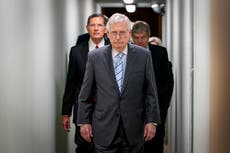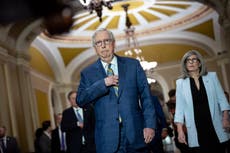Republicans forced to contemplate a Senate without Mitch McConnell
Whoever succeeds Mitch McConnell will not be nearly as effective or focus as much on governing as the longest-serving Republican leader

Your support helps us to tell the story
From reproductive rights to climate change to Big Tech, The Independent is on the ground when the story is developing. Whether it's investigating the financials of Elon Musk's pro-Trump PAC or producing our latest documentary, 'The A Word', which shines a light on the American women fighting for reproductive rights, we know how important it is to parse out the facts from the messaging.
At such a critical moment in US history, we need reporters on the ground. Your donation allows us to keep sending journalists to speak to both sides of the story.
The Independent is trusted by Americans across the entire political spectrum. And unlike many other quality news outlets, we choose not to lock Americans out of our reporting and analysis with paywalls. We believe quality journalism should be available to everyone, paid for by those who can afford it.
Your support makes all the difference.About a year and a half ago, I was outside Senate Minority Leader Mitch McConnell’s office, just off the Senate floor, and decided to check my email. About a few minutes in, Mr McConnell emerged to walk to the Senate floor. Immediately, I jumped out of shock as if I were a high schooler whose principal caught him with a cigarette.
Mr McConnell commands a kind of fear that few other Senators or elected officials do. Save for his weekly press briefings, he is perhaps the only elected official reporters don’t even try to elicit a comment from as he approaches the floor or recedes to his office.
Where journalists whip out their phones to talk to Speaker Kevin McCarthy, who loves the back and forth, and Bob Dole famously said that the most dangerous place in Washington was between Senate Majority Leader Chuck Schumer and a microphone, reporters often leave the Kentuckian be.
It’s a reflection of his power, something Mr McConnell, the man who tells the story of how his mother and doctors helped him walk after a polio diagnosis to reach the peak of congressional politics, has sought his whole life. When he does speak, he chooses his words carefully, which means people have to pay attention to what he doesn’t say as well as to what he does.
That makes his latest health scares all the more shocking for Washington. On Wednesday, he once again froze during a press conference in Kentucky, which required his aide to repeat questions asked by reporters. Mr McConnell’s latest incident came a month after the Republican leader had to leave a press conference after he was rendered unable to speak.
On Thursday, the Capitol Hill doctor gave the Kentucky senator a clean bill of health that allowed him to resume normal activities. Earlier this year, he took a spill at the Waldorf Astoria Hotel in Washington during a fundraiser, which briefly put him out of commission. When he returned, he at times looked more wobbly, a sign of how diminished his injury left the 81-year-old.
Now, his latest freeze-up has made Washington, and more importantly Senate Republicans, fathom the unthinkable: what does the Senate look like without him?
The truth is, most people don’t really know. Mr McConnell assumed the leadership post in 2007, after Democrats routed the GOP and took control of the Senate. He has served an additional 16 years, acting during that time as the chief obstructionist to Barack Obama’s agenda while later making sure Donald Trump reshaped the federal judiciary.
His defenders see someone who is ruthless in his wielding of power and who helped give the Supreme Court its 6-3 majority. To liberals, he’s a sign of everything wrong with Washington: a craven opportunist who often chose party over commonsense legislation and used procedure to gum up good policies. Conservative critics consider him a RINO for his willingness to work with Democrats, most notably Joe Biden during the latter’s time as vice president and now as president, and his unwillingness to support right-wing Senate candidates whom he views as unelectable.
Unlike Nancy Pelosi, perhaps the only operator in Washington with as successful a record as him but who lacked a clear successor, Mr McConnell has an army of proteges. His most notable acolytes are “The Three Johns”: Minority Whip John Thune, former Whip John Cornyn, and Conference Chairman John Barrasso. If he were to indeed step aside soon, one might imagine the three will engage in a power struggle that could split the conference.
At the same time, it is unlikely that anyone will be able to run the Senate GOP the way that Mr McConnell did. Throughout his time leading Republicans, he sought to tame the hard right faction of the GOP. He saw them as tainting the brand of the GOP after candidates like Sharron Angle in Nevada and Christine O’Donnell in Delaware in 2010 blew Republicans’ chances to take the Senate and Todd Akin in Missouri and Richard Murdock in did so again in 2012.
But over time, more of the hard-right ideologues have infiltrated the Senate GOP conference and have raised hell. After being considered an establishment golden boy, Sen Josh Hawley has become more of a fist-pumping bomb-thrower who led the efforts to challenge the 2020 election results. In 2010, Sen Rand Paul beat Mr McConnell’s preferred candidate in the primary in his own backyard in Kentucky.
In addition, many of his lieutenants were succeeded by Trump acolytes: last year, Roy Blunt, often an enforcer, was replaced by Trump loyalist Eric Schmitt; Rob Portman, who negotiated the bipartisan infrastructure bill with Democrats, preceded JD Vance, a one-time Trump critic who the former president later praised for “kissing my ass;” and Richard Burr, the former Intelligence Committee Chairman, was succeeded by the pro-Trump Ted Budd.
Similarly, after the GOP failed to flip a single seat in the US Senate, a coterie of Republicans attempted to challenge him. Mr McConnell easily did away with them, but another challenger might now not be be dealt with so simply.
Furthermore, while Mr McConnell knew how to “get Joe on the phone” to make a deal with Mr Biden and Democrats to do the hard work of governing, a future Senate Republican leader might not have the incentive to do so. Mr McConnell’s eventual exit, voluntary or not, will ultimately signal a new chapter of GOP politicking in the Senate.



Join our commenting forum
Join thought-provoking conversations, follow other Independent readers and see their replies
Comments